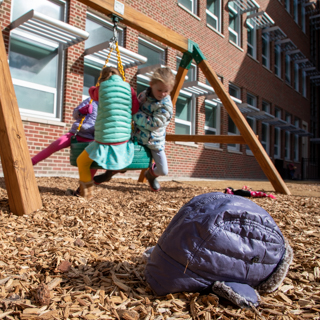Research Projects

Current Research Projects
Supporting the Mental Health of Immigrant Youth
Researchers:
Anisa N. Goforth, PhD, Department of Psychology, University of Montana
There are approximately one in four children in the United States who live with at least one immigrant parent (Zong & Batalova, 2015). For many of these immigrant youth, they the process of acculturation may affect their academic success and social-emotional well-being. Research on immigrant youth is substantially underrepresented in school psychology.
There are a number of projects related to this overall topic:
- Examining acculturation, acculturative stress, psychological well-being and religious practices in Arab American adolescents
- Executive functioning and mathematic performance among bilingual youth (collaboration with Andy Pham, PhD, Florida International University)
- Association of first generation immigrant mothers' acculturation and children's externalizing symptoms (collaboration with Stacy Bender, PhD, Alfred University and D'Andrea Jacobs, PhD, Baltimore County Public Schools)
- Content analysis of acculturation research in school psychology (collaboration with Andy Pham, PhD, Florida International University, Sara Castro Olivo, PhD Texas A&M University, and Heejung Chun, PhD, New Mexico State University)
Project SELA: Social-Emotional Learning in Arlee
Researchers:
Jingjing Sun, Ph.D., (Principal Investigator), Department of Teaching & Learning, University of Montana
Anisa N. Goforth, PhD, Department of Psychology, University of Montana
Lindsey Nichols, PhD, Department of Counselor Education, University of Wyoming
Across the U.S., American Indian and Alaska Native (AI/AN) youth experience significant mental health disparities compared to their peers from other ethnic groups (2014 Native Youth Report). According to the 2014-15 Montana Youth Risk Behavior Survey database, 8.9 percent of Montana high school students attempted suicide one or more times during the past 12 months, and the rate for AI/AN students are nearly 9 times higher than the national average. Despite the urgency of this public health issue, however, there are very few suicide prevention programs designed for schools with a large population of AI/AN students (Wyman et al., 2010), highlighting the significant need for developing a mental health intervention program that incorporates the unique culture, strengths, and values of AI/AN youth. Moreover, research shows that effective suicide prevention must be initiated prior to the onset of internalizing and externalizing symptoms and suicidal behaviors, and move beyond focusing on individual students to systematically addressing broader social-ecological factors, such as school-wide culture and youth-adult connectedness. Thus, there is a critical need for evidence-based mental health intervention programs for young AN/AN children that can broadly influence their surrounding social-ecological system (Wyman, 2014).
The long-term goal of this research is to address this need and reduce mental health disparities among AI/AN youth.
Aim 1. Develop a culturally appropriate, multi-layer SEL program through Community-Based Participatory Research that includes social-emotional trainings for children, teachers, and parents/caregivers of the Native community.
Aim 2. Conduct a pilot study to examine the effectiveness of the SEL program on children’s mental health development.
Funded by the American Indian/Alaska Native Clinical and Translational Research Program under the National Institute of General Medical Sciences of the National Institutes of Health under award number U54GM115371
Resiliency in Indian Country: Ecological Factors that Contribute to Educational and Mental Health Disparities among Native American Students
Researchers:
Anisa N. Goforth, PhD, Department of Psychology, University of Montana
Olivia G. Holter, M.A., Doctoral Candidate, Department of Psychology, University of Montana
Nearly five million people identify as American Indian or Alaska Native (U.S. Census Bureau, 2010) in the United Staets. In many rural or frontier states like Montana, Native Americans are the largest ethnic group. Although the numbers of Native American students graduating from high school and attending college have increased over the past two decades, nationwide gaps still persist on key education indicators (Mackety & Linder-VanBershot, 2008). For example, Native American student continue to underperform in 4th and 8th grade reading and math compared to other ethnic minority students (National Assessment of Educational Progress, 2011).Approximately 27% of Native American boys are placed in special education compared to 13% of White, 16% of Blacks and 12% of Hispanic boys (Ross et al., 2012). Moreover, the dropout rate of Native Americans was almost twice the national average and more than twice the dropout rate of their White peers (Aud et al., 2011). Nearly 22% of Native Americans ages 25 or older have not completed high school (U.S. Census Bureau, 2014).
There are a number of current projects related to educational and mental health disparities:
- examining longitudinal factors that contribute to educational and mental health disparities
- investigating the representation of Native American youth in special education in the state of Montana (collaboration with the Montana Office of Public instruction)
- training school psychologists to provide evidence-based practices using cultural humility
- microaggressions and mainstream perspectives of Native American history in middle and high school texts
Culturally Responsive Practices with Refugee Youth
Researchers
- Diana Diaków, M.A., Doctoral Candidate, Department of Psychology, University of Montana
- Anisa N. Goforth, PhD, Department of Psychology, University of Montana
Refugee children experience a wide range of psychological effects from the escalation of military, political, and social conflicts that ultimately affects their survival, security, development, and well-being (UNICEF, 2017; Jabbar & Zaza, 2014). There is a lack of research, however, examining the factors that contribute to resiliency among refugee children. We are examining factors that impact refugee children’s mental health, particularly from an ecological perspective (i.e. individual, social, and environmental) that facilitate refugee children’s’ recovery from trauma.
Effectiveness of Youth Engagement Through Intervention (YETI)
Researchers:
- Anisa N. Goforth, PhD Department of Psychology, The University of Montana
- Jennifer Schoffer Closson, MS, CCC-SLP, Department of Speech, Language, & Hearing Disorders, University of Montana
Children with Autism Spectrum Disorder (ASD) are characterized as having difficulties in the social domain (American Psychiatric Association [DSM-IV-TR], 2000). Children with ASD experience difficulties related to social communication, emotional reciprocity, ability to share interests and activities with others, or poor quality social overtures (APA, 2000). Children with ASD who were included in regular education classes were less socially connected to their classmates, were less well-accepted, and had fewer reciprocal friendships than typically developing peers (Chamberlain, Kasari, and Rotheram-Fuller, 2007). Furthermore, low social connectivity and reciprocity tend to get increasingly more disparate with age (Rotheram-Fuller, Kasari, Chamberlain, & Locke, 2010). Social inclusion and social skill development, therefore, may need to be facilitated through explicit skill building and other intervention techniques.
The impact of ASD, however, is not limited to the child. Families and caregivers of children with ASD experience more stress in both parenting and child-related domains and have increased depressive symptoms (Baker-Ericzen, Brookman-Frazee, & Stahmer, 2005; Ingersoll & Hambrick, 2011). Furthermore, mother’s stress levels are also inversely related to social abilities of their child with ASD (Baker-Ericzen, Brookman-Frazee, & Stahmer,2005). These research findings highlight the importance of addressing challenges for families of children with ASD, and, as Baker-Ericzen, Brookman-Frazee, and Stahmer (2005) posit, the need for increased family support and adjunctive parent interventions.
Considering the impact of ASD on the social abilities of children and the related difficulties on families, it is paramount that methods are developed and tested to ameliorate this core deficit. Unfortunately, the research on social skills training for children with ASD is comprised of relatively few studies demonstrating measurable gains (Beaumont & Sofronoff, 2008).
As a result, the purpose of this study is to examine the effectiveness of a social skills intervention for children diagnosed with Autism Spectrum Disorder and their caregivers. Specifically, this goal of this study is to determine whether a child and parent intervention leads to increased child social responsiveness, overall social skills, and self-concept and reduction of parental/caregiver stress.
Improving Teacher's Understanding of Children's Mental Health for Academic Success
Researchers:
- Lindsey Nichols, PhD, Department of Counselor Education, University of Wyoming
- Anisa N. Goforth, PhD, Deptarment of Psychology, University of Montana
Incidences of school violence, high drop-out rates, and poor academic performance in U.S. schools has motivated an increased focus on the mental health needs of K-12 students. Educators are implementing programs aimed at interventions to address learning and behavioral needs. In Montana, the Montana Behavioral Initiative (MBI)/Positive Behavioral Interventions and Supports (PBIS) has integrated the data-driven model Response to Intervention (RTI) as an intervention to promote the academic achievement of all students. Statistics show a significant percentage of children and adolescents struggling with mental health concerns, therefore educators with daily student contact must to have the tools to recognize, effectively interact with, and refer students with mental health needs. This proposed grant seeks to provide critical knowledge, skills, and awareness to pre-service and in-service teachers in Montana regarding mental health and mental health support personnel in schools. Two trainings will be provided; the first training will be conducted with pre-service teachers to provide information on the roles of various support personnel in the schools focused on student mental health. The second training will be available to both pre-service and in-service teachers with additional information regarding support personnel in the school while also providing basic helping skills and information regarding mental health. Various assessments will be used to evaluate the effectiveness of the training and identify teacher knowledge, skills, and awareness in mental health facilitation. The collected data will adapt the training to continue addressing the needs of teachers to provide an optimal learning environment for all students’ academic success.
